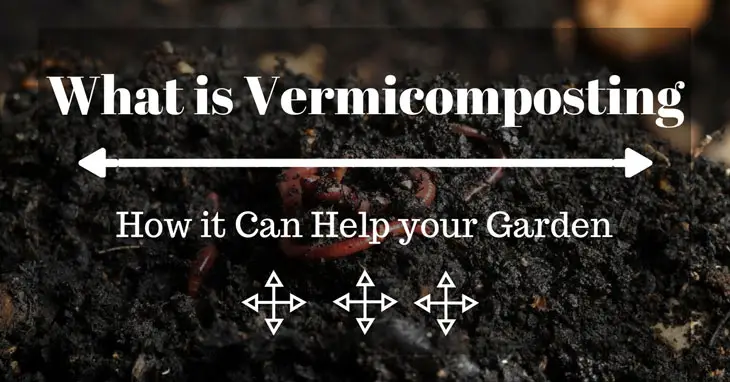What is Vermicomposting and How it Can Help Your Garden
For organic gardeners, finding a good source of natural fertilizers to boost plant growth can be a little challenging. If you are still looking at a good option, vermicomposting is worth trying. In this article, I will explain what is vermicomposting and how you can use this to keep a healthy growth in your garden.
More...
What is Vermicomposting?
Vermicomposting is the process of making high-quality compost from organic wastes using earthworms. It is one of the most effective ways of composting kitchen wastes. This, in turn, has a double-sided benefit. It helps you get rid of kitchen wastes while providing a steady supply of healthy soil for your garden.
Under ideal conditions, worms can consume organic matter amounting to their weight. As a result, their casts (poop) contain microorganisms that make plants healthy. What’s notable about their casts is that they don’t contain disease pathogens, so they are safe for the soil and plants.
Vermicomposts have many applications. Aside from gardening, you can also use them for turfgrass, landscaping, potting soil and viticulture.

Common Misconceptions about Vermicomposting
A lot of people are reluctant in starting a vermicomposting project especially indoors. They have this common misconception that it will attract flies and is stinky.
Vermicomposting is not stinky. It smells more like garden soil. If maintained properly, you’ll have healthy living organisms inside the bin that will not produce a noticeable smell. Also, since the bin is covered, no flies or roaches will go inside it.
What Makes Vermicomposts Useful for Plants
Worm casts contain seven times more phosphorus, five times more nitrogen, and about 11 times more potassium than found in ordinary soil. These are the minerals that are vital for plant growth. Moreover, worm casts are rich in humic acids which are natural soil conditioner. Their pH balance is also neutral which is ideal for growing most types of plants.
Types of Worms for Vermicomposting
Some gardeners who are new to vermicomposting have this misconception about the type of worm to use in this process. These are not the ordinary burrowing earthworms you normally see in garden soil.
You can check this video to give you an idea on how vermicomposting worms look like:
There are two popular breeds of worms used for vermicomposting. They are the Lumbricus rubella and the Eisenia foetid. You can buy them at many garden centers in your area. You can also purchase them via mail order from worm farms.
Number of Worms Needed
I mentioned earlier that vermicomposting worms consume organic matter as much as their body weight. Organic matter can be fruit and vegetable peelings, spoiled foods, leftovers, garden trimmings, and scrap paper. If you are producing 2 pounds of organic matter daily, you’ll also need 2 pounds of worms.
Bin Size
When it comes to bin size, a good ration would be one pound of worm per one square foot of surface area. In our example, you will need a bin with at least 2 square feet of surface area. But note that the population of worms can double each month or even more than that. In an ideal condition, a pound of worms will increase to 35 pounds in one year.
The rapid increase rate in the worm population allows them to adjust to the conditions inside the bin. However, as the bin gets full of worms, they will either leave or die off. But before transferring the compost to your garden or pots set aside some work for your new box to keep it going.

How to Get Started
You need to prepare the following to get started:
- Bin with lid. You need to poke some air holes in the lid.
- Worms
- Organic matter. The ideal ratio is 70 percent brown matter (paper and dead material) plus 30 percent green matter (food scraps and plants)
Procedure
- 1. Add all the organic matter in the bin and mix them.
- 2. Add the worms and cover the lid.
- 3. Once a week, mix the materials in the bin to allow aeration. Make sure to keep the layer of shredded paper on top to avoid bugs and bad smell. You could add new organic matter daily depending on the capacity of your bin.
- 4. Once you stop putting in a new organic matter, the compost should be ready to harvest in 1-2 months. You will know when it’s ready for harvest when your compost is already deep blackish brown.

Important: Items You Cannot Feed to Your Worms
- Meat, grease, bones, and fats
- Glossy or plastic coated paper
- Products with yeast such as bread or cakes
- Spices
- Dairy products
- Pet droppings
- Citrus peelings or juice
- Garlic, onion, and anything that smells
- Infested plants
- Treated wood products
Tips for Optimum Harvest
- To help the worms thrive, keep the bin moist. The ideal temperature inside the bin should be between 55 and 75 degrees Fahrenheit. Keep your bin away from heaters, air conditioners, and the oven.
- Worms like it when you chop the food scraps into smaller pieces before adding them to the bin.
- The worms can be left alone without food for about 3 to 4 weeks. This is great especially if you frequently travel. However, if left for a long time without organic matter, your bin will start to smell.
- If your compost smells rotten, it could be that the bin is too moist or too dry. If too moist, you can add some shredded paper to absorb the water. If it’s too dry, you can spray a little water on top. Most importantly, aerate your compost once a week.

Conclusion
Vermicomposting is a way of giving back to the environment. With this method, you can recycle your organic waste into something that will help your plants grow. The process of vermicomposting is very straightforward, as we have mentioned above. The materials are also not expensive. It is worth trying for gardeners like you.
References:
http://lancaster.unl.edu/pest/resources/vermicompost107.shtml
Are we able to give you a good answer to what vermicomposting is? If you have other thoughts we failed to discuss here, please comment below. Don’t also forget to share this article with your fellow gardeners.

